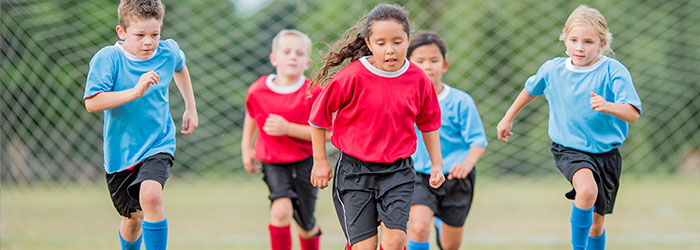
A concussion is not just a “bump on the head.” It is a traumatic brain injury that needs proper treatment whether it is mild or severe. At Wesley Pediatric Specialists, our expert physicians specialize in concussion treatment and management for children and child athletes up to age 18.
What is a concussion?
A concussion occurs when the brain is violently jarred back and forth or is rotated inside the skull as a result of a blow to the head or body. This movement can “stun” brain cells or even result in cell death. While many believe a concussion only occurs when a person loses consciousness, this is not true!
Symptoms may appear immediately or develop over several days. They may last a few days to several months and interfere with schoolwork and social life.
Concussion symptoms
The following are symptoms to watch for if you suspect your child has a pediatric concussion:
- Headache
- Dizziness
- Confusion
- Vision changes or vision disturbance
- Loss of balance
- Loss of consciousness
- Nausea
- Ringing in the ears
- Difficulty concentrating
- Memory loss
Concussion management
The best known treatment for a concussion in children is rest. However, it can take from one to three weeks to fully recover, and it is very important that your child is monitored throughout entire recovery process.
Managing a concussion means creating a support system around your child. Adults at home, at school and those supervising sports need to change and modify the environment around the student athlete or child to maximize his or her concussion recovery.
Returning to play or normal activity before the brain has healed from concussion may result in more frequent and recurring concussions. That can lead to even more lost playing time, as well as an increasingly serious condition known as second impact syndrome, a severe swelling of the brain that potentially can be fatal.
Second Impact Syndrome
Second impact syndrome occurs when a second concussion is sustained while still recovering from a first concussion. The injury occurs during a time when the brain is still injured and not able to protect itself to the best of its ability. This can be catastrophic, even leading to death.
Post-Concussive Syndrome
Post-concussive syndrome is the consequence of previous head injury. This term now is being used to identify concussed patients who are not improving as expected. Post-concussive syndrome does not appear to be associated with how significant the concussion was. Instead, it seems to be related to the location of the brain injury. Post-concussive syndrome is generally defined as the development of at least three of the following symptoms persisting at least four to six weeks:
- Headache
- Dizziness
- Fatigue
- Irritability
- Social difficulties
- Anxiety
- Insomnia
- Concentration or memory difficulty
- Intolerance of stress.
Anyone displaying these symptoms requires thorough physical and neurological examinations by a medical specialist. Individuals with a history of attention- deficit/hyperactive disorder, learning disability, migraine headaches or psychiatric conditions may be at a greater risk of experiencing post-concussive syndrome.
Baseline Test for Student Athletes
Concussions can occur in many different settings and in almost any sport, including cheerleading. But athletes in contact sports such as football, hockey, soccer, basketball and baseball have a 10 to 20 percent chance of experiencing a concussion each season. In high school football alone, players across the United States experience as many as 250,000 concussions each year, according to national statistics.
Contact us to learn more about scheduling a Baseline Test for your student athlete: (316) 962-2080.
A baseline test looks at a student athlete’s balance and brain function. Ideally, this assessment takes place before the first practice of the season or beginning of the school year. The test scores balance, concentration and memory. This information is invaluable if a concussion is suspected. The physicians can compare results from the original baseline test to those from a follow up exam. This can help determine if the athlete’s brain function has been impacted. Baseline tests also help physicians in making decisions regarding return to school and play.
Concussion Clinic
The Wesley Children’s Hospital Concussion Clinic at Wesley Pediatric Specialists was created to treat and manage concussions in children throughout the entire recovery process. If you suspect your child has a concussion, take him/her to see your primary care provider or urgent care. After that evaluation, if the symptoms continue or get worse over the next two weeks, the patient may be referred to our clinic for further evaluation and treatment.
Our experienced physicians provide expert diagnosis and treatment for concussions in partnership with a medical team that includes neuropsychology, physical therapy, occupational therapy and speech-language pathology.
The Wesley Children’s Hospital Concussion Clinic is held twice monthly at Wesley Pediatric Specialists, 3243 E. Murdock St., Suite 500.
For more information about the clinic or to set up an appointment, please call (316) 962-2301.